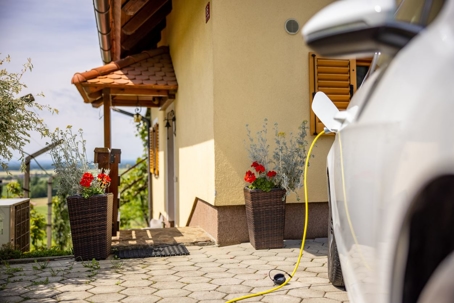Why You Need a Home EV Charger
While having access to an EV charger at work is undoubtedly beneficial, it doesn't eliminate the need for a home EV charger. Firstly, the convenience of home charging is unmatched. You can charge your vehicle overnight without impacting your daily schedule, ensuring your EV is always ready for use. This is particularly useful for unexpected trips when you might not have time to charge at work.
Secondly, relying solely on workplace charging can be risky. If the charging stations at work are occupied, out of service, or if you change jobs, your charging routine could be disrupted. A home charger offers charging security, ensuring you always have a reliable power source.
Lastly, most electricity tariffs are cheaper during off-peak hours, usually starting after 8 pm. Charging your EV at home during these hours can lead to significant savings in your EV vehicle-related energy expenses.
Owning a home EV charger, therefore, provides not only convenience and reliability but also potential cost savings.
Where to Start When Planning Your EV Charger Installation
So, you know you want an EV charger at home, but where do you start? If you are a residential homeowner planning to install an EV charger at home, there are several factors that you should consider before making your final decision. Keep reading for some top considerations you should keep in mind when installing an EV charger at home.
1. Electrical Requirements: Before installing an EV charger, ensuring your electrical panel can handle the additional load is important. Most EV chargers require a dedicated circuit and a minimum of 40 amps. You may need to upgrade your electrical panel or install a sub-panel to accommodate the new charger.
2. Location: The location of your EV charger matters for both convenience and safety. It should be placed in an area that is easily accessible and away from other potential hazards, such as gas lines or flammable materials. You should also consider the charging cableandrsquo;s length to ensure it can reach your vehicle.
3. Permits: In San Jose, you must obtain permits before installing a Level 2 EV charger at your home. These permits ensure that the installation meets local safety standards and that a licensed electrician performs the work.
4. Type of Charger: There are several types of EV chargers, including Level 1 chargers that use a standard 120-volt outlet, Level 2 charging stations that allow you to charge your vehicle fully overnight, and even solar-powered charging stations.
5. Cost: The cost of installing an EV charger can vary depending on several factors, such as the type of charger, electrical upgrades, and permits. However, depending on the charger you install, you may qualify for rebates that cover a portion of the charger and installation costs.
Choose Valley Heating, Cooling, Electrical and Solar for Your EV Charger Installation
When it comes to installing your home EV charger, it's essential to trust the job to experienced professionals. At Valley, we have a team of licensed, insured electricians who are highly trained and skilled in installing home EV chargers. Our experts understand the technical requirements and compliance standards associated with EV charger installation, ensuring a seamless and safe setup.
We can help with the installation of any residential EV charger, including:
- Level 1 charging stations
- Level 2 charging stations
- Smart charging stations
- Solar charging stations
Choosing us for your EV charger installation means choosing peace of mind. You can rest assured that your charger will be installed correctly, efficiently, and to the highest safety standards. Furthermore, our team can assist in navigating the permit process and selecting the most suitable charger for your specific needs.
Troubleshooting Your Home EV Charger
If you encounter issues with your home EV charger, don't panic. There are a few common problems that you can troubleshoot yourself before contacting a professional. Here are some steps to take:
- Check the power supply: Ensure that the charger is correctly plugged in and that the circuit breaker hasn't been tripped. If your charger isn't receiving power, checking the source is an excellent first step.
- Inspect the charging cable: Look for any signs of wear or damage to the charging cable. If the cable is damaged, it may not provide a consistent charge or may not work at all.
- Refer to the user manual: Your charger's user manual is a valuable resource for troubleshooting. It will typically have a section dedicated to common problems and solutions.
- Update software: Some chargers require software updates for optimal performance. Check if there are any updates available for your charger.
If you're still facing problems after trying these steps, it's time to call the professionals. At Valley, we offer comprehensive EV charger repair services. Our team of experienced technicians can diagnose and resolve issues with your EV charger, ensuring it operates effectively and safely. Remember, working with electrical systems can be dangerous if you're not trained, so it's always best to leave repairs to the experts.
Have questions about EV charging at your home? Give Valley a call.

